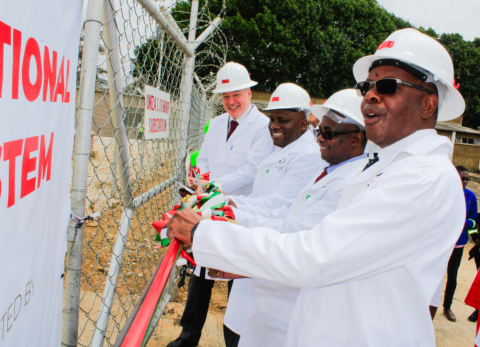
The University of Zambia (UNZA), through the School of Engineering, has received a digitally empowered high-voltage substation, which will be used for hands-on training for the students in the School of Engineering.
Speaking at the handover ceremony Minister of Energy, Mr Matthews Nkhuwa, said the gesture by cooperating partners to supplement Government efforts on the power diversification through the provision of the hands-on start of the art high tech equipment was commendable. Mr Nkhuwa added that the installation of such advanced equipment for the University of Zambia, School of Engineering would help to produce students with tailored made skills ready for the industry.
“It is my hope that this equipment will be used for example to create prototypes for energy mix, smart grids, use of hydropower in conjunction with wind, solar, diesel and other forms of energy in an integrated way,’’ he said. The Minister challenged the staff and students to fully utilize the facilities in conducting hands-on practical lessons, training and research for the benefit of the country and the sub-region, as a whole.
And UNZA Vice Chancellor, Prof. Luke Mumba said UNZA thanked the sponsors for their support and added that the university was in dire need of such equipment if it was to produce highly qualified academic and professional staff.
Prof Mumba said it was gratifying to note that the combined partnership to install the Mini-Grid High Voltage Substation with ABB, Education Partnership in Africa (EPA), Copperbelt Energy Corporation (CEC) and the German government which started in 2015 with the UNZA and Copperbelt University (CBU) had come to fruition.
“Our desire is to be comparable to the best universities around the world in all aspects of what makes a university. I am hopeful that this equipment we are receiving today will not only ensure quality engineering training but will also help ensure the development of Zambia because this country cannot develop without a sound engineering base,” he said.
Prof Mumba said the university was proud that all the degrees awarded by the School of Engineering were accepted by the Engineering Institution of Zambia (EIZ) and other professional bodies and were recognized for enrolment in foreign universities.
Prof Mumba further said the gesture to secure such infrastructure will attract students in the sub-region and beyond to train using these facilities.
“In addition, the school has continued to offer tailor-made short courses and consultancy services to cater for various needs of the local industry. For example, we are currently partnering with Road Development Agency (RDA) to look at the state of our bridges in the country and we are employing state of the art technology-namely drones’’, he said.
Meanwhile, ABB Representative and Global Head of Government Relations Mr Tobias Becker said ABB was proud to be associated with the UNZA and the government through the support of education and training. He said ABB recognizes that companies had a responsibility not only to their customers and their investors but also to the societies in which they operate.
Mr Tobias Becker added that ABB was structured so that best help can be created to secure power supply and maximize productivity in Industrial, commercial and utility operations. He further said the intention was to bridge the gap between industrial needs and training by ensuring students in universities were well-equipped for the field after graduation. Mr Becker also revealed that besides the support the company had rendered to the university through the installation of the mini-substation, ABB would also take two engineering graduates for a comprehensive three-year in-house training programme.
“So far two trainees have completed their programme, two have completed their first year of training, and another pair joined ABB earlier in April,’’ he said.
Meanwhile the Dean School of Engineering Dr Michael Mulenga said the gesture to be handed down the state of the art and digitally operated substation was humbling and he was hopeful that the substation would provide an enabling environment which will help to produce graduates who were ready for the vast engineering market.
“We pledge to utilize this facility to the best of our abilities, and offer wider services, through consultancy and research work within and beyond.
“We are extremely thankful for the continuous support offered by ABB Zambia, CEC, and ZESCO, for making significant contributions to promote capacity building in engineering education for Zambia,” he said.
The Dean expressed gratitude to various stakeholders, Germany, Sweden and other countries that have rendered unwavering support to the institution and ultimately providing a conducive environment, where MoUs’ and partnerships of this nature thrive.
ABB, the Swiss-Swedish-multinational corporation headquartered in Zurich, operating in robotics, power, heavy electrical equipment and automation technology areas and working with various players, Copperbelt Energy Corp., Zambia Electricity Supply Corp., Germany, Swedish Governments, consultants, EPA, among others, pioneered the financing, upgrading and modernization of the training equipment into a digital state of the art.